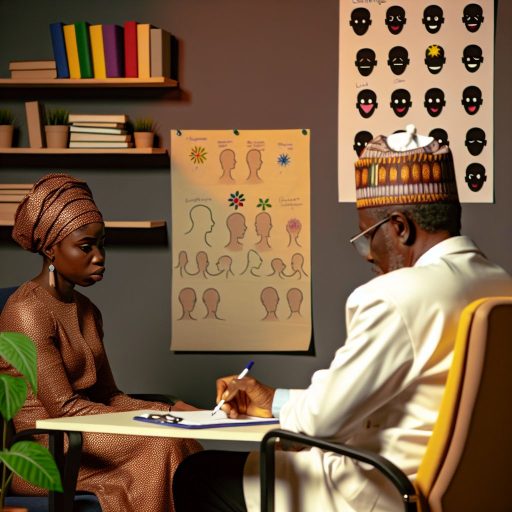Introduction:
Exploring the role of culture in Nigerian mental health practices is crucial to understanding the unique ways in which mental illness is perceived and treated in the country.
Cultural beliefs and practices play a significant role in shaping the approach towards mental health treatment and care.
Overview of Nigerian culture:
Nigerian cultural beliefs, values, and norms are deeply rooted in traditions and customs.
The culture is a blend of diverse ethnic groups, each with its unique practices and beliefs.
Respect for elders, communal living, and strong family ties are central values in Nigerian culture.
Diversity of cultures within Nigeria:
Nigeria is home to over 250 ethnic groups, each with its own language, traditions, and worldviews.
This diversity can impact mental health practices as beliefs and attitudes towards mental health vary.
Traditional healing practices, such as talking drums and herbal medicine, are often used alongside modern methods.
Influence of traditional beliefs on mental health:
- Explore traditional Nigerian beliefs related to mental health, such as spiritual causes of illness.
- Discuss the role of traditional healers in treating mental health issues.
Traditional beliefs play a significant role in shaping mental health practices in Nigeria.
These beliefs are deeply rooted in cultural and spiritual traditions that have been passed down through generations.
Understanding the influence of traditional beliefs is crucial in addressing mental health issues in the Nigerian context.
Exploring traditional Nigerian beliefs related to mental health:
In Nigerian culture, mental health is often perceived through a spiritual lens.
Traditional beliefs attribute mental illness to spiritual causes, such as ancestral curses, witchcraft, or divine punishment.
This belief system shapes how mental health issues are understood and addressed within communities.
Many Nigerians turn to traditional healers, known as “dibia” or “babalawo,” for treatment of mental health issues.
These healers are believed to have special powers to communicate with spirits and provide remedies for spiritual afflictions.
The role of traditional healers in Nigerian society is deeply ingrained and continues to influence mental health practices.
The role of traditional healers in treating mental health issues:
Traditional healers play a crucial role in the treatment of mental health issues in Nigeria.
They offer spiritual cleansing rituals, herbal remedies, and divination practices to address perceived spiritual causes of mental illness.
Many Nigerians rely on traditional healers for diagnosis and treatment of mental health problems.
Despite the growing presence of modern healthcare systems in Nigeria, traditional healers remain a critical part of the mental health landscape.
Their knowledge of traditional healing practices and spiritual beliefs provides a unique perspective on mental health that complements Western medical approaches.
Collaboration between traditional healers and mental health professionals is essential in providing holistic care for individuals struggling with mental health issues.
The influence of traditional beliefs on mental health practices in Nigeria cannot be understated.
Understanding and respecting these beliefs are essential in providing culturally sensitive and effective care for individuals experiencing mental health challenges.
By recognizing the role of traditional healers and integrating their practices into modern mental health services, Nigeria can promote holistic well-being and support the mental health needs of its population.
Explore Further: Key Haematology Labs and Services in Nigeria
Stigma surrounding mental health in Nigerian culture:
- Address the stigma and discrimination associated with mental health in Nigerian society.
- Examine how cultural beliefs contribute to the stigmatization of mental illness.
In Nigerian culture, there exists a significant stigma surrounding mental health.
This stigma is deeply ingrained in societal norms and beliefs, making it challenging for individuals struggling with mental illness to seek help and support.
The fear of judgment and discrimination often prevents people from opening up about their mental health struggles, leading to isolation and a lack of access to proper care.
One of the main reasons for the stigma surrounding mental health in Nigeria is the belief that mental illness is a sign of weakness or a spiritual problem.
Many Nigerians associate mental health issues with spiritual possession or curses, which adds a layer of shame and secrecy to the already delicate topic.
This cultural belief system can further isolate individuals suffering from mental illness since they may fear being ostracized by their community.
Furthermore, in Nigerian society, there is a tendency to view mental health problems as a personal failing rather than a legitimate medical condition.
This mindset perpetuates the idea that individuals should be able to overcome mental health challenges on their own, without the need for professional help or medical intervention.
As a result, many people struggle in silence, afraid to seek the support they desperately need.
The stigmatization of mental illness in Nigerian culture extends beyond personal beliefs to institutional discrimination as well.
Mental health facilities and services are often underfunded and inaccessible, making it even more difficult for individuals to receive proper treatment.
Additionally, mental health professionals may face their own biases and prejudices, further complicating the path to recovery for those in need.
It is crucial for Nigerian society to address and combat the stigma surrounding mental health.
Transform Your Career with Expert Guidance
Get personalized mentorship consulting that’s tailored to your unique path. Our expert advice is actionable and exclusive.
Get StartedEducation and awareness campaigns can help debunk myths and misconceptions about mental illness, encouraging open and honest conversations about this important topic.
By normalizing discussions about mental health and providing support for those in need, Nigeria can create a more compassionate and understanding society for all its citizens.
See Related Content: Training Programs for Obstetricians in Nigeria
Integration of Western and traditional mental health practices:
- Western mental health practices are becoming more intertwined with traditional healing methods in Nigeria.
- This integration is essential in providing a holistic approach to mental health care.
- It allows individuals to access a variety of treatment options that cater to their cultural beliefs.
- By combining Western and traditional practices, mental health professionals can offer more personalized care.
- This approach recognizes the importance of culture in shaping an individual’s mental well-being.
Discuss how Western mental health practices are being integrated with traditional Nigerian healing methods:
- Therapists are incorporating culturally relevant interventions into their treatment plans.
- Traditional healers are collaborating with mental health professionals to provide comprehensive care.
- Psychiatrists are learning about indigenous healing practices to better understand their patients’ perspectives.
- Community-based programs are blending Western and traditional approaches to reach a wider audience.
Highlight the importance of culturally sensitive mental health care in Nigeria:
- Cultural sensitivity ensures that mental health services are respectful and responsive to the beliefs of each individual.
- It promotes trust and rapport between patients and mental health providers, leading to better outcomes.
- Cultural competence helps to reduce stigma around mental health issues in Nigerian society.
- It encourages individuals to seek help and participate in treatment without fear of judgment.
- By embracing cultural diversity, mental health care in Nigeria becomes more inclusive and effective.
Learn More: Dental Therapy Professional Associations in Nigeria

Importance of community and family support in mental health treatment:
- Emphasize the role of community and family in providing support for individuals with mental health issues.
- Discuss how Nigerian cultural values of collectivism and interdependence impact mental health care.
The role of community and family support:
Community and family support play a crucial role in the mental health treatment of individuals.
Having a strong support system can greatly aid in the recovery process and overall well-being of those struggling with mental health issues.
In Nigerian culture, community and family are at the core of societal structure and values.
This emphasis on collectivism and interdependence has a direct impact on how mental health care is approached and provided.
Collectivism in Nigerian culture:
In Nigerian culture, collectivism is a fundamental value that emphasizes the importance of community and the collective well-being over individual needs and desires.
This value system is reflected in the way mental health care is approached, as individuals are often encouraged to seek support from their community and family members when facing mental health challenges.
This sense of solidarity and interconnectedness fosters a supportive environment where individuals feel understood and cared for.
Interdependence in mental health care:
The concept of interdependence in Nigerian culture highlights the interconnectedness of individuals and the reliance on one another for support and assistance.
This principle is reflected in mental health care practices, where individuals are not expected to face their struggles alone but rather are encouraged to seek help from their community and family.
This collaborative approach to mental health care allows for a more holistic and comprehensive treatment plan that addresses the individual’s needs in a culturally relevant and supportive manner.
Community resources and support networks:
Nigerian communities are rich in resources and support networks that can aid in the mental health treatment of individuals.
From traditional healers and spiritual leaders to community organizations and support groups, there are various avenues through which individuals can access the support they need.
These community resources play a vital role in complementing formal mental health services and providing a holistic approach to care that takes into account cultural beliefs and practices.
Explore Further: Ophthalmology Equipment: What Nigerian Clinics Use
Role of Culture in Nigerian Mental Health Practices
Culture plays a significant role in shaping beliefs.
It influences perceptions and treatment-seeking behaviors.
Cultural considerations such as spirituality affect approaches to care.
Communal support systems also play a crucial role in mental health practices.
Traditional healing practices further influence mental health care delivery.
Cultural competence in mental health practices is essential for effectiveness.
Understanding and respecting cultural contexts is necessary when seeking help.
Mental health professionals must demonstrate cultural sensitivity.
They should be open-minded and willing to adapt their practices.
Such adaptations meet the diverse needs of Nigeria’s population.
Incorporating cultural competence into services enhances accessibility.
Improved mental health outcomes will result from these changes.
Additional Resources
Perinatal depression in Nigeria: perspectives of women, family …
Indigenous mental healthcare and human rights abuses in Nigeria …




